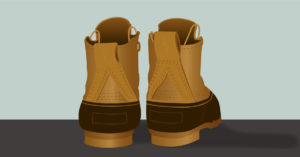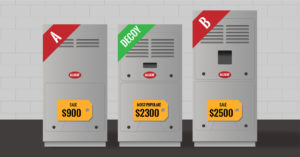How To Boost Your HVAC Sales According To Psychology
By Randy Breneman on Friday, January 26, 20189 Psychology-Based Tips and Tricks to Help You Sell HVAC Equipment and Increase Your HVAC Leads
After a long career working in HVAC, you could probably repair an air conditioning unit with your eyes closed. Sleeping. With your hands tied behind your back. You know the ropes of installation and repair, but selling your services might pose a bit more of a challenge.
Does pitching a service or product to a customer make you nervous? Sweating so much you think your AC unit might need repaired? Well, fret not! An entire field in psychology dedicates itself to understanding consumer behavior! We’ve put the most valuable tips from this discipline in a list to help your HVAC business get more leads, retain more clients, and sell more services.
1. Understand the customer.

Appeal to emotion
We’ve all heard the phrase. You never know what HVAC needs someone has until you take a walk in their shoes. Now, before you try fitting your size 13’s in a size 6 pair of heels, take a step back! When you assess a need a customer has, taking a step back can help you understand the person you are dealing with. Imagining their needs and wants can lead to a better knowledge of what you should sell and how you should sell.
Reading body language and hearing tone of voice can better equip you, as an HVAC technician, to respond. When you arrive at their home, take in your surroundings. Is there anything else that needs replaced that your customer hasn’t noticed yet? Making these assessments and utilizing your HVAC expertise could potentially save lives by preventing unforeseen emergencies like AC fires.
Understanding the customer can also play a role when pitching a service or item. Appealing to emotion, then justifying your appeal with facts, is a key psychological tactic often used in ads. However, even though these appeals are primarily used in controlled formats like commercials or print, they also easily transfer to field service! Understanding the emotional value of an item can help you sell bigger ticket HVAC equipment like a high-end AC unit, heater, or refrigerator. Ka-ching!
2. The more they see you, the more they like you.
Mere Exposure Effect
If you see something all the time, odds are you’re going to like it. This concept may seem counterintuitive, but its real-life applications are shown time and time again. Studies show that people rate someone they’ve seen multiple times before as more attractive than a complete stranger. That’s right, playing hard to get doesn’t work (shocker, I know).
This concept can apply to symbols and objects as well. You know when something new becomes fashionable and at first you hate it? “Those shoes are horrific. Who in their right mind would wear those?!” Then you start to see them around more often. They become tolerable, you suppose. A little more time passes and BOOM! You look down and they’re on your feet. You! You in your right mind slowly but surely came to like those ugly, ugly shoes and wear them too!
Sound familiar? This is known as the mere exposure effect; the more you see something, the more you like it.
Your HVAC business can use this technique to generate new leads and increase customer retention. Sending out the same technician to a repeat client can ensure their continued business with your company. (If you can’t send out the same technicians or don’t want to, this effect can also be seen if your technicians wear a uniform and your trucks are wrapped with your logo.)
Increasing your HVAC business’ brand visibility should be a vital part of your HVAC business plan. It is just another great way for clients to view you as a more appealing choice! Basically, the more you see something, the more you look at it through rose-tinted glasses. When deciding between your HVAC business and another, guess which one a person will pick. That’s right! It’s you.
3. Ask small first.
Foot-in-Door technique
Agreeing to something small makes a person more likely to agree to larger things later. This is called the foot-in-the-door technique. Saying yes to something mild creates a bond between two people, setting a precedent for that relationship. Saying no afterwards threatens that bond, meaning a person is more likely to say yes afterwards to a larger request.
For example, an HVAC technician could start by asking the client if they could sign a document. Since that is a minimal request, the answer is very likely to be yes. Questions should lead up to the scale of the big request (let’s say, asking if they would like an air filter change), further strengthening the bond. The customer would then be more likely to agree to a large request—like a new fridge—than if that was one of the first questions.
4. Or ask really big.
Door-in-the-face technique
Funnily enough, the opposite is true as well. The door-in-the-face technique (no, I’m not making these names up!) says that one is more likely to agree to a request when a deliberately humongous request is made beforehand. So asking a client first if they want a new AC unit is a great way to ensure an air filter sale.
5. Give before you take.
The Reciprocity Principle
You’ve just moved into your new house. You’ve barely started unloading the moving boxes, and you hear three swift raps on the door. Knock, knock, knock. Lo and behold, it’s your neighbors, eager-eyed and faces hurting from the bright smiles adorning them. They’ve brought you cake, and with that one kind act, your neighborly transactions begin.
What if I told you your neighbors were taking advantage of a psychological technique called the reciprocity principle? When somebody does something for you, you feel inclined to do something in return. If your HVAC technicians start off by providing a service for free, the client is more likely to agree to another service in return. Don’t know what to offer for free? How about an estimate? The returns on this HVAC business plan will make it worthwhile!
6. Be wanted.
Exclusivity
Let’s face it, we all want what we can’t have. When an option is scarce, it becomes more valuable. We hear “Limited Edition” and our hearts start racing. Saying that you’re out of a particular model or part puts the blame on your business, but saying that an item is sold out at the moment makes it exclusive.
The exclusivity principle can be used when selling an item as well. Positioning an item as scarce and wanted sets the pressure on your client; if they don’t get that new unit today, they may never be able to get it.
Exclusivity can also be used to validate a purchase. Even though they were already making the purchase, saying they got the last one makes them more satisfied in that decision and less likely to have buyer’s remorse.
Other applications of exclusivity in selling include setting a time-constricted deal or a wait list for particular HVAC equipment.
7. Set your expectations high.
Pygmalion Effect
This tactic is unique in that it can be used in both HVAC management and by the technicians. The pygmalion effect, besides being a very effective tongue-twister, essentially manifests one’s expectations in reality; if you think it, it will be. A study on this effect discovered that teachers’ expectations shaped the students’ progress (or lack of) at the end of the year.
As an HVAC business owner or manager, having high expectations for your technicians will result in better results from them. This works regardless of whether or not they know your expectations for them are high!
As an HVAC technician trying to make a sale on a service or an item, expecting a successful sale also increases the odds of a positive outcome. When you exude confidence and expect success, the HVAC sales and HVAC leads will come!
8. Set the stage.
Framing Questions, Decoy Effect
Selling is all about the pitch. Your pitch has to be persuasive, colorful, and logical for somebody to want to make a purchase. After all, people typically don’t make HVAC purchases on a whim, do they? Informing the customer while convincing them is important when selling an HVAC item or service.
By framing your pitch, you can control the way your client processes the information you give them. Set the path for your argument and the sale will follow. Another way to do this is by using the decoy effect in your item pricing. When someone makes a decision between item A and item B, they will likely to choose the cheaper one. Adding a third item as a “decoy” option can change which item the customer would normally choose.

Let’s say you normally sell a basic furnace for $900 and a high-end furnace for $2500. When comparing only these two options, most of your customers choose the $900 option. However, if you added a third medium-level fridge for $2300, the high-end fridge will look like a steal.
This effect can also be utilized in selling service packages. If a filter change costs $30 and an AC unit repair normally costs $150, changing your pricing can influence purchases. Instead price both the AC unit repair and a combined filter change/AC unit repair at $165. Guess which option is going to look like a steal?
The decoy effect when used in selling HVAC can also be a useful way to generate HVAC leads online. Keep in mind that your decoy option should not be middle-level in all aspects. Its value should be close to the first option, and its price should be close to the other option. Otherwise, people have a tendency to choose the option in the middle.
9. People just want to fit in.
Conformity
What would convince you to use an energy-saving mode on your heater?
1. Saving money.
2. Morality.
3. Everybody else is doing it.
Most people like to think that morality would make that decision for them. If not, saving a few bucks off the energy bill would do the trick, right? Wrong!
According to a study done on this very subject, what you think everybody else is doing has the largest effect on energy conservation.
We don’t like to think of ourselves as sheep, but the fact of the matter is that if all our friends were to jump off a cliff, we’d probably jump too. (Sorry, mom.)
Once you know this, you and your HVAC company can use this to your advantage. Casually mention that everybody else in the neighborhood has purchased preventative maintenance, and sure enough, you’ll sell another plan today.
To Conclude
Selling in your HVAC business can be intimidating, but incorporating a few psychology-based tips and tricks into your HVAC business plan can help make it easier and more effective. The psychologists did the work to test these effects. Now, it’s up to your HVAC business to reap the benefits!


